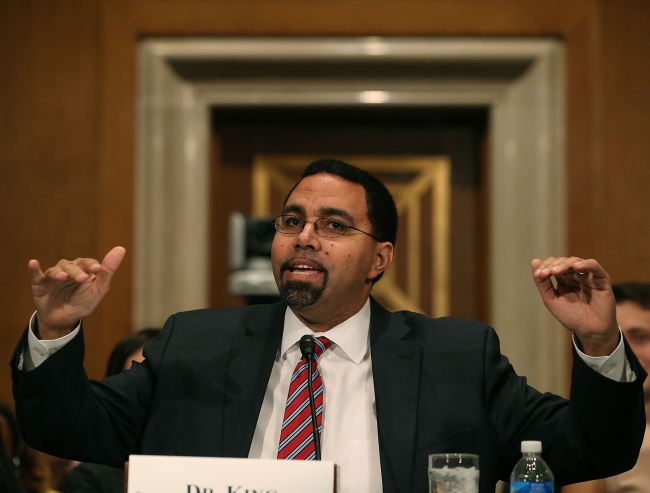You have /5 articles left.
Sign up for a free account or log in.

Education Secretary John B. King Jr.
Getty Images
The American Civil Liberties Union and National Consumer Law Center on Tuesday asked a federal court to force the U.S. Department of Education to turn over various documents that show how the government collects student loan debt from defaulted borrowers.
The groups filed a lawsuit against the Education Department, accusing it of violating the Freedom of Information Act by failing to release information about the department’s debt collection policies and its oversight of the private companies hired to collect student loans.
Among the questions that the groups are seeking to answer, they said, is whether the Education Department’s debt collection practices disproportionately affect borrowers of color, who are more likely to have student loan debt in the first place.
The department’s preliminary response to their public records request, which was filed last May, indicates that the department does not monitor its debt collection program for racial disparities. The Office of Federal Student Aid “does not track race or data related to race,” a department official wrote in a letter.
The public records request filed by the two groups last May also seeks the department’s policies for using -- and instructing its debt collectors how to use -- the various tools it has to collect student loans from borrowers who default, such as wage garnishment, tax refund offsets and other methods.
The department earlier this month provided more than 1,700 pages of documents that responded only to parts of the groups’ 20-part Freedom of Information Act request. Even so, those documents were “heavily redacted,” the ACLU and NCLC said. The department did not provide any documents in response to some of the requests.
“The Department of Education is acting like it has something to hide,” Rachel Goodman, a staff lawyer with the ACLU’s Racial Justice Program, said in a statement. “The public has a right to know how a taxpayer-funded agency handles debt collection to ensure it is done in a fair and nondiscriminatory way.”
Dorie Nolt, the department's press secretary, said in an email that officials were “reviewing the FOIA request sent by these organizations to determine if more information can be provided on this topic. The singular goal of our student loan program is to help all students get a degree that sets them up for success, and we take the treatment of our borrowers -- particularly historically underserved students -- very seriously.”
Also at issue in the lawsuit is the public availability of a voluminous manual that the Education Department provides to the companies it hires to collect student loans on its behalf. The document instructs the department’s debt collectors on how to interact with borrowers. The department told the ACLU and NCLC earlier this month that it was still making a decision on whether to release that specific document. But the department has previously cited the law enforcement exemption in the Freedom of Information Act as a reason why it will not fully release the manual.
The ACLU and NCLC argue in their lawsuit that the department’s use of the law enforcement records exemption to withhold from the public other, similar information about its debt collection program is “straightforwardly unlawful.”
If the lawsuit moves forward, a federal judge could evaluate for the first time the department’s argument that parts of the debt collection manual are law enforcement records that it can keep secret under the Freedom of Information Act.
Inside Higher Ed obtained an unredacted copy of a previous iteration of that document -- which is available here -- but the document has since been significantly revised by the department several times. The department previously posted the entire manual on its website, but took it down after a reporter wrote about it.
The Education Department has come under criticism before from consumer groups, Senate Democrats and its own inspector general for not properly overseeing the companies it hires to collected defaulted federal student loans.
Inside Higher Ed reported earlier this month that the Education Department recently rehired two of the five debt collection agencies it said last year would be fired for misleading student loan borrowers.
The National Consumer Law Center also filed a Freedom of Information lawsuit against the Education Department in 2014 after it failed to turn over data showing the performance of its private debt collection firms, including borrower complaints against the companies and the amount of bonuses they received. The department ultimately provided the data, which the center analyzed in a report.




